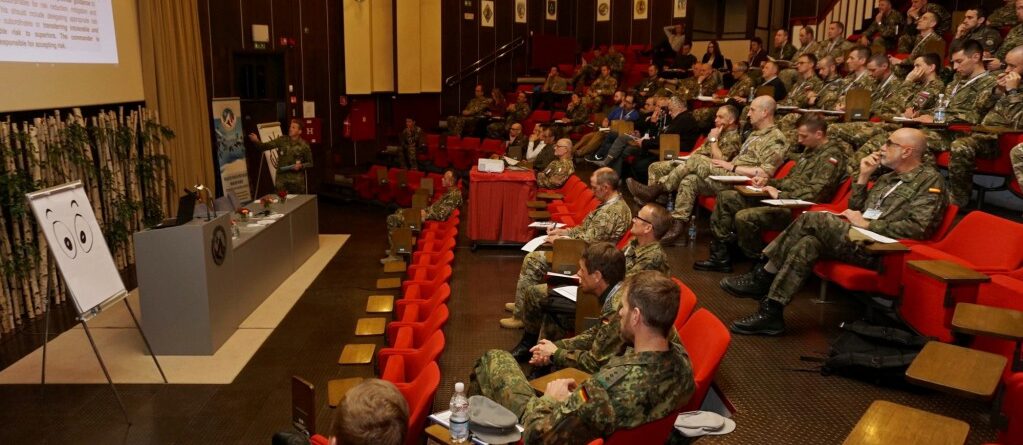Second MW Congress
The NATO MW COE organized the 2nd Mountain Warfare (MW) Congress between 9th and 12th April 2019 in Poljče, Slovenia.
The aim was to provide the community of interest with a deeper knowledge of the current state of the art of Risk Management, and to share knowledge and experience from different points of view and at a depth that is not normally reached during military training and education. The speakers and experts from various nations showed both military and civilian viewpoints, thus enabling the participants to make their own conclusions as to their responsibility in real military life as a “decider-maker”.
The event was a platform which offered the opportunity to enhance individual ranges and levels of competence, thus enabling the Congress participants to “act out of knowledge”.
The Director of the NATO MW COE opened the Congress by welcoming all the participants, and then gave the floor to the Doctrine and Standardization Branch (DSB) Head, LTC Reinhold Ramesberger, the MW Congress project leader for the second year in a row.


COL Boštjan Blaznik, NATO MW COE Director, and LTC Reinhold Ramesberger, NATO MW COE DSB Head
Next, Dr Franz Fischer set the frame of the Congress and showed some examples of how risk management is practised in different domains in civilian life, thus enabling the participants to transfer his insights to their own risk management in military life.
Dr. Franz Fisher, Lecturer, Risk Manager in finance, and coach and trainer in risk management
A tangible approach from a civilian perspective of risk management in extreme situations was presented by Phillip Reiter. As a participant in a multinational team doing the “Long Way” in 2018, with 50 peaks and 90,000 m of height gained in 36 days in extreme weather and terrain conditions, he stressed issues such as decision-making, dealing with injured team members, and sustainability. MAJ Chevallier further elaborated this topic from a military perspective.
Phillip Reiter (DEU), extraordinary mountaineer, extreme ski tourer, trail runner and mountain photographer, and MAJ Jacque-Olivier Chevallier (FRA), deputy chief of the Group Militaire de Haute Montagne
Speakers from the USA, Norway, Switzerland and Germany provided different expert approaches to avalanche risk management. All these speakers are experts in their topics, as they have dealt with these issues for many years in the day-to-day work of their professions.
Dr. Benjamin Zweifel (CHE) presented the Avalanche Bulletin, and Mr. Karl Slingerland (USA) explained the Alaskan approach to avalanche risk management
Dr. Wolfgang Behr (DEU) presented the strategic approach and CPT Aanon Clausen (NOR) the Norwegian approach
Dr. Philipp Weißgraeber showed the use of innovative technologies in avalanche prediction, presenting the fundamentals of fracture mechanics and strategies for efficient mechanical modelling. This is developing a new conceptual understanding of crack initiation based on physical considerations. He demonstrated a model that aims to improve safety and may serve as a tool for avalanche warning services and risk management.

Dr. Philipp Weißgraeber (DEU), scientist at Darmstadt Technical University
Dr. KlausBurger provided some insights from German law and risk management. In tangible national examples, he elaborated on “deciders-awareness” from a judicial point of view.

Dr. Klaus Burger (DEU), Director of the District Court, former prosecutor, mountain and air rescuer, Head of the district mountain rescue service and reserve officer
The Congress also provided some points for action where risk management has failed and a situation (of local crisis) appears. Organized rescue, the tools of crisis intervention teams, and, in the event of death, the asset of military chaplains, may be helpful tools for military leadership in a crisis situation.

Klemen Volontar (SVN), presented organized rescue in winter conditions


Psychological first aid speaker Evi Partholl (DEU) and SUS XIII Violeta Mesarič (SVN) presented the religious aspects and help
In addition, a field display and interesting industrial developments were presented in Vogel and Bohinjska Bistrica.


Dr. Jože Duhovnik (SVN), mechanical engineer, showed the possibilities of how an avalanche can be triggered by a drone


SSG Miha Rakar (SVN), Education and training branch instructor, presented organized rescue in winter conditions


SFC Rafael Kolbl (SVN), Doctrine and Standardization branch, gave an overview of snow stability testing methods.



Industry day presentations
The 2nd MW Congress brought together subject matter experts from 14 nations with speakers who shared their knowledge and experience from different points of view. The NATO MW COE is also looking forward to organizing a MW Congress in 2020, and it becoming a regular annual event.[envira-gallery id=”2396″]









